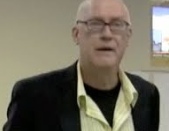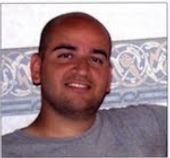Meriwether Lewis - Murder or Suicide?
 |
This historical whodunnit is actually a lot more straightforward than some would have us believe.
|

Meriwether Lewis and suicide. Two pistol shots rang out in the wilderness night. From out in the dark a man staggered and fell against a stump then crawled to his lodgings. At daybreak, the woman of the house summoned up the courage to enter the man's room. A piece of her lodger's forehead had been blown off, exposing his brains. He begged the woman or one of her servants to take his rifle and finish the deed, offering all his money in his trunk as a reward.
Another account reports that the lodger was found by one of the servants, busily engaged in cutting himself from head to foot. Minutes later, one of America's great heroes - a true hero in an age of heroes - would be dead. Captain Meriwether Lewis, protégé of Thomas Jefferson, leader of the Lewis and Clark expedition, and Governor of the vast Louisiana Territory was all of 35.
In his book, "Undaunted Courage", historian Stephen Ambrose sets out a compelling narrative of the extraordinary leadership displayed by Meriwether Lewis in taking a small band of men on a spectacular journey of discovery through 8,000 miles of untracked wilderness, much of it occupied by hostile Indians.
My New Book!

Purchase now.
Over the course of two years Lewis was required to be all things to all men - part frontiersman, part soldier, part medic, part naturalist, part geographer, part journalist, part diplomat. He was handpicked for the job by none other than his mentor Thomas Jefferson, the ultimate renaissance man. Imagine, sitting at the same dinner table with perhaps the most fascinating man of the millennium. Meriwether Lewis did, every evening for two years.
Soon, the ambiance would be far different:
"Our vessels consisted of six small canoes, and two large perogues," he wrote in his journals.
This little fleet altho' not quite so rispectable as those of Columbus or Capt. Cook, were still viewed by us with as much pleasure as those deservedly famed adventurers ever beheld theirs; and I dare say with quite as much anxiety for their safety and preservation. we were now about to penetrate a country at least two thousand miles in width, on which the foot of civilized man had never trodden; the good or evil it had in store for us was for experiment yet to determine, and these little vessells contained every article by which we were to expect to subsist or defend ourselves.
The following entry demonstrates his scientific interest in the territory:
I found by several experiments that a table spoon full of water exposed to the air in a saucer would evaporate in 36 hours when the mercury did not stand higher than the temperate point at the greatest heat of the day ...
And this description of the Great Falls of the Missouri reveals the mind of a poet:
...irregular and somewhat projecting rocks below receives the water in it's passage down and brakes it into a perfect white foam which assumes a thousand forms in a moment sometimes flying up in jets of sparkling foam...
And so it goes, scientist, poet, adventurer, renaissance man gushing forth in a creative stream that would mysteriously fall silent for weeks at a time. Those strange silences would later speak volumes, but the eventual success of the mission all but drowned out any signs of trouble ahead.
Lewis and his men arrived back to heroes' welcomes, and Lewis himself became the toast of the town in Washington DC and Philadelphia. But signs of strange behavior were creeping in. He unaccountably kept putting off the publication of his journals, and drug abuse and deep depressions helped undermine his post as Governor of the Louisiana Territory.
Still, there was no denying his hero status, and soon he would be returning once more to the open arms of his friends and admirers back east. But he never made it back. His mentor Thomas Jefferson was greatly saddened but not at all surprised:
"Governor Lewis," he wrote, "had, from early life, been subject to hypochondriac affections. It was a constitutional disposition in all the nearer branches of the family of his name, and was more immediately inherited by him from his father."
There was no question in Jefferson's mind: "About three o'clock in the night," he wrote, "he did the deed ..."
But many historians have since taken issue:
"It seems impossible," one wrote, "that a young man of 35 ... on his way ... to the capital of the nation, where he knew he would be received with all the distinction and consideration due his office and reputation, should take his own life."
Wrote another: "The Meriwether Lewis they knew did not lose his courage nor his head in times of trial." And still another: "By temperament, he was a fighter, not a quitter."
But the plain facts tell another story, even if no one actually saw Lewis put the gun to his head. In "Undaunted Courage," Stephen Ambrose notes Lewis' depressive tendencies, his odd behavior, and his deteriorating mental condition, including a reported suicide attempt and an army officer's precautionary surveillance mere days before.
As to why so many who should know better simply refuse to face the truth, Dr Kay Jamison in "Night Falls Fast" postulates:
...scholars and laypeople alike find it hard to hold in their minds the thought that a great man could have been deranged or that a courageous man could have killed himself. But such men do. And the same bold, restless temperament that Jefferson saw in the young Meriwether Lewis can lie uneasily just this side of a restive, deadly despair.
In Jamison's mind, suicide was never a blot to Lewis' character, only a tragedy, the logical outcome of a deadly depressive temperament, one that can take down even the best of us, even a hero amongst heroes.
Published early 2000s, reviewed Jan 15, 2011
 |
More famous people articles. |




